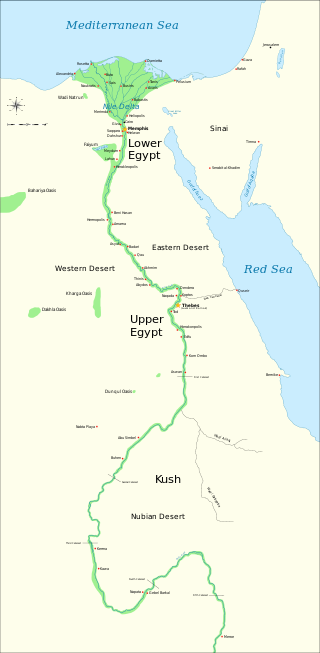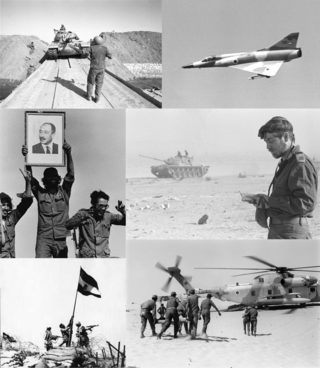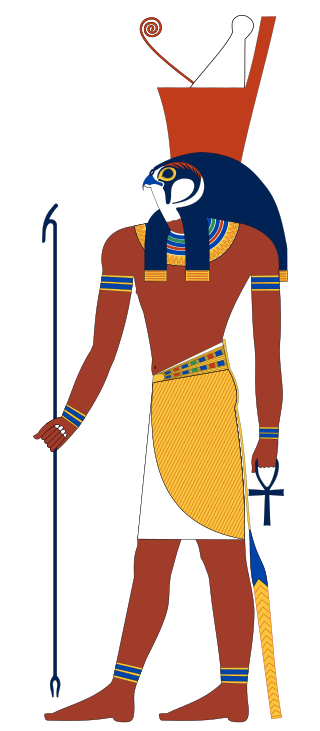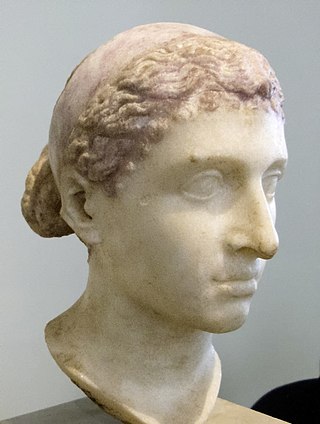
Ancient Egypt was a civilization of ancient Northeast Africa. It was concentrated along the lower reaches of the Nile River, situated within the contemporary territory of modern-day Egypt. Ancient Egyptian civilization followed prehistoric Egypt and coalesced around 3100 BC with the political unification of Upper and Lower Egypt under pharaoh or king Menes. The history of ancient Egypt unfolded as a series of stable kingdoms interspersed by periods of relative instability known as "Intermediate Periods". The various kingdoms fall into one of three categories: the Old Kingdom of the Early Bronze Age, the Middle Kingdom of the Middle Bronze Age, or the New Kingdom of the Late Bronze Age.

Alexandria is the second largest city in Egypt and the largest city on the Mediterranean coast. It lies at the western edge of the Nile River delta. Founded in c. 331 BC by Alexander the Great, Alexandria grew rapidly and became a major centre of Hellenic civilisation, eventually replacing Memphis, in present-day Greater Cairo, as Egypt's capital. Called the "Bride of the Mediterranean" internationally, Alexandria is a popular tourist destination and an important industrial centre due to its natural gas and oil pipelines from Suez.

Cairo is the capital and largest city of Egypt and the Cairo Governorate, being home to more than 10 million people. It is also part of the largest urban agglomeration in Africa, the Arab world and the Middle East. The Greater Cairo metropolitan area is the 12th-largest in the world by population with over 22.1 million people.

Pharaoh is the vernacular term often used for the monarchs of ancient Egypt, who ruled from the First Dynasty until the annexation of Egypt by the Roman Republic in 30 BCE. However, regardless of gender, "king" was the term used most frequently by the ancient Egyptians for their monarchs through the middle of the Eighteenth Dynasty during the New Kingdom. The earliest confirmed instances of "pharaoh" used contemporaneously for a ruler were a letter to Akhenaten or an inscription possibly referring to Thutmose III.

The Six-Day War, also known as the June War, 1967 Arab–Israeli War or Third Arab–Israeli War, was fought between Israel and a coalition of Arab states, primarily Egypt, Syria, and Jordan from 5 to 10 June 1967.

The Yom Kippur War, also known as the Ramadan War, the October War, the 1973 Arab–Israeli War, or the Fourth Arab–Israeli War, was fought from 6 to 25 October 1973 between Israel and a coalition of Arab states led by Egypt and Syria. Most of the fighting occurred in the Sinai Peninsula and Golan Heights, territories occupied by Israel in 1967. Some combat also took place in Egypt and northern Israel. Egypt aimed to secure a foothold on the eastern bank of the Suez Canal and use it to negotiate the return of the Sinai Peninsula.

The Egyptian language, or Ancient Egyptian, is an extinct branch of the Afro-Asiatic languages that was spoken in ancient Egypt. It is known today from a large corpus of surviving texts, which were made accessible to the modern world following the decipherment of the ancient Egyptian scripts in the early 19th century.

Horus, also known as Heru, Har, Her, or Hor in Ancient Egyptian, is one of the most significant ancient Egyptian deities who served many functions, most notably as the god of kingship, healing, protection, the sun, and the sky. He was worshipped from at least the late prehistoric Egypt until the Ptolemaic Kingdom and Roman Egypt. Different forms of Horus are recorded in history, and these are treated as distinct gods by Egyptologists. These various forms may be different manifestations of the same multi-layered deity in which certain attributes or syncretic relationships are emphasized, not necessarily in opposition but complementary to one another, consistent with how the Ancient Egyptians viewed the multiple facets of reality. He was most often depicted as a falcon, most likely a lanner falcon or peregrine falcon, or as a man with a falcon head.

Muhammad Anwar es-Sadat was an Egyptian politician and military officer who served as the third president of Egypt, from 15 October 1970 until his assassination by fundamentalist army officers on 6 October 1981. Sadat was a senior member of the Free Officers who overthrew King Farouk I in the Egyptian Revolution of 1952, and a close confidant of President Gamal Abdel Nasser, under whom he served as vice president twice and whom he succeeded as president in 1970. In 1978, Sadat and Menachem Begin, Prime Minister of Israel, signed a peace treaty in cooperation with United States President Jimmy Carter, for which they were recognized with the Nobel Peace Prize.

Ancient Egyptian hieroglyphs were the formal writing system used in Ancient Egypt for writing the Egyptian language. Hieroglyphs combined ideographic, logographic, syllabic and alphabetic elements, with more than 1,000 distinct characters. Cursive hieroglyphs were used for religious literature on papyrus and wood. The later hieratic and demotic Egyptian scripts were derived from hieroglyphic writing, as was the Proto-Sinaitic script that later evolved into the Phoenician alphabet. Egyptian hieroglyphs are the ultimate ancestor of the Phoenician alphabet, the first widely adopted phonetic writing system. Moreover, owing in large part to the Greek and Aramaic scripts that descended from Phoenician, the majority of the world's living writing systems are descendants of Egyptian hieroglyphs—most prominently the Latin and Cyrillic scripts through Greek, and the Arabic and Brahmic scripts through Aramaic.

Gamal Abdel Nasser Hussein was an Egyptian military officer and politician who served as the second president of Egypt from 1954 until his death in 1970. Nasser led the Egyptian revolution of 1952 and introduced far-reaching land reforms the following year. Following a 1954 assassination attempt on his life by a Muslim Brotherhood member, he cracked down on the organization, put President Mohamed Naguib under house arrest and assumed executive office. He was formally elected president in June 1956.

Muhammad Hosni El Sayed Mubarak was an Egyptian politician and military officer who served as the fourth president of Egypt from 1981 to 2011.

The Suez Crisis also known as the Second Arab–Israeli War, the Tripartite Aggression in the Arab world and as the Sinai War in Israel, was a British–French–Israeli invasion of Egypt in 1956. Israel invaded on 29 October, having done so with the primary objective of re-opening the Straits of Tiran and the Gulf of Aqaba as the recent tightening of the eight-year-long Egyptian blockade further prevented Israeli passage. After issuing a joint ultimatum for a ceasefire, the United Kingdom and France joined the Israelis on 5 November, seeking to depose Egyptian president Gamal Abdel Nasser and regain control of the Suez Canal, which Nasser had earlier nationalised by transferring administrative control from the foreign-owned Suez Canal Company to Egypt's new government-owned Suez Canal Authority. Shortly after the invasion began, the three countries came under heavy political pressure from both the United States and the Soviet Union, as well as from the United Nations, eventually prompting their withdrawal from Egypt. Israel's four-month-long occupation of the Egyptian-occupied Gaza Strip and Egypt's Sinai Peninsula enabled it to attain freedom of navigation through the Straits of Tiran, but the Suez Canal was closed from October 1956 to March 1957.

Cleopatra VII Thea Philopator was Queen of the Ptolemaic Kingdom of Egypt from 51 to 30 BC, and the last active Hellenistic pharaoh. A member of the Ptolemaic dynasty, she was a descendant of its founder Ptolemy I Soter, a Macedonian Greek general and companion of Alexander the Great. Her first language was Koine Greek, and she is the only Ptolemaic ruler known to have learned the Egyptian language, among several others. After her death, Egypt became a province of the Roman Empire, marking the end of the Hellenistic period in the Mediterranean, which begun during the reign of Alexander.

The Egypt national football team, nicknamed "Pharaohs", represents Egypt in men's international football, and is governed by the Egyptian Football Association (EFA), the governing body of football in Egypt.

The Ptolemaic Kingdom or Ptolemaic Empire was an Ancient Greek polity based in Egypt during the Hellenistic period. It was founded in 305 BC by the Macedonian Greek general Ptolemy I Soter, a companion of Alexander the Great, and ruled by the Ptolemaic dynasty until the death of Cleopatra VII in 30 BC. Reigning for nearly three centuries, the Ptolemies were the longest and final dynasty of ancient Egypt, heralding a distinctly new era for religious and cultural syncretism between Greek and Egyptian culture.

Egypt, officially the Arab Republic of Egypt, is a country spanning the northeast corner of Africa and the Sinai Peninsula in the southwest corner of Asia. It is bordered by the Mediterranean Sea to the north, the Gaza Strip of Palestine and Israel to the northeast, the Red Sea to the east, Sudan to the south, and Libya to the west. The Gulf of Aqaba in the northeast separates Egypt from Jordan and Saudi Arabia. Cairo is the capital and largest city of Egypt, while Alexandria, the second-largest city, is an important industrial and tourist hub at the Mediterranean coast. At approximately 107 million inhabitants, Egypt is the 14th-most populated country in the world, and the third-most populated in Africa.

Ramesses II, commonly known as Ramesses the Great, was an Egyptian pharaoh. He was the third ruler of the Nineteenth Dynasty. Along with Thutmose III of the Eighteenth Dynasty, he is often regarded as the greatest, most celebrated, and most powerful pharaoh of the New Kingdom, which itself was the most powerful period of ancient Egypt. He is also widely considered one of ancient Egypt's most successful warrior pharaohs, conducting no fewer than 15 military campaigns, all resulting in victories, excluding the Battle of Kadesh, generally considered a stalemate.

Mohamed Salah Hamed Mahrous Ghaly, known as Mohamed Salah or Mo Salah, is an Egyptian professional footballer who plays as a right winger or forward for Liverpool and captains the Egypt national team. Widely regarded as one of the best players of his generation, one of the greatest African players of all time and one of the greatest wingers in the history of the sport, he is known for his clinical finishing, dribbling, speed, and playmaking abilities.

Abdel Fattah Saeed Hussein Khalil El-Sisi is an Egyptian politician and retired military officer who has been serving as the sixth and current president of Egypt since 2014.



















